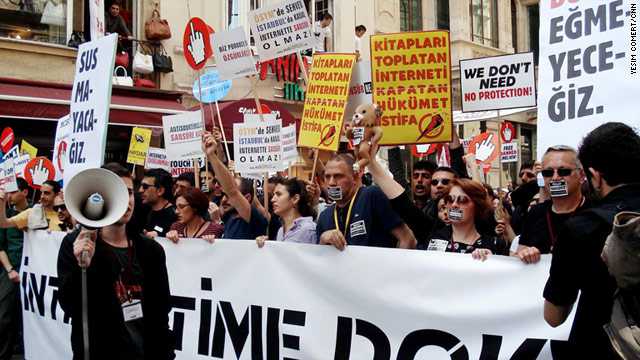Internet Filters Set Off Protests Around Turkey
By SEBNEM ARSU
ISTANBUL — Thousands of people in more than 30 cities around Turkey took to the streets on Sunday to protest a new system of filtering the Internet that opponents consider censorship.
The Information and Communications Technologies Authority, known by its Turkish initials as B.T.K., is going to require Internet service providers to offer consumers four choices for filtering the Internet that would limit access to many sites, beginning in August.
Protesters in Taksim Square in Istanbul called the action, which regulators say is intended to protect minors, an assault on personal freedom and liberty.
The B.T.K., however, has said that Internet users will still be able to access all content if they choose the “standard” option for filtering. The other filtering options are labeled as “children,” “family” and “domestic.”
Tayfun Acarer, the chairman of the B.T.K., told reporters this month that the change came about because of complaints and demands for safer Internet use in Turkey.
Thousands of protesters in Taksim Square, who were organized through a Facebook page, chanted, “Yes, we ban!” In Ankara, the capital, people cheered, “The Internet is ours and will remain ours!”
For many people in Turkey, having to select a filtering option is just another form of censorship. Already thousands of Web sites are blocked by the state, mostly without any publicized reason.
Furthermore, the B.T.K. recently issued a ban on the use of dozens of casual words on the Internet, like “girl,” “partner” and “animal.” It has not explained how this word ban will be policed.
The most controversial act of Internet censorship in Turkey, so far, was against YouTube, which was blocked in 2007 after the posting of a video that was deemed insulting to Mustafa Kemal Ataturk, the founder of modern Turkey. Insulting Ataturk is a criminal offense in Turkey.
That ban was lifted after more than two years when the content was removed from the Web site.
via Turkey Protests New Internet Filters – NYTimes.com.




